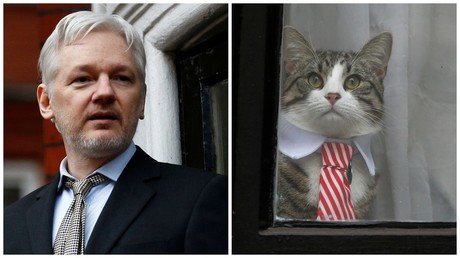US ‘secretly charged’ Assange, prosecutor accidentally reveals – WikiLeaks
Julian Assange has been already charged by the US, but the case will remain sealed until the arrest of the whistleblower, WikiLeaks has revealed citing court filings unrelated to its co-founder.
“…no other procedure is likely to keep confidential the fact that Assange has been charged,” assistant US Attorney Kellen S. Dwyer wrote urging a judge to keep the matter sealed. However, the exact nature of the alleged charges against the whistleblower was not immediately revealed and is not to be disclosed until Assange’s arrest, according to the document.
WikiLeaks tweeted the document on Thursday, saying it was an “apparent cut-and-paste error.”
SCOOP: US Department of Justice "accidentally" reveals existence of sealed charges (or a draft for them) against WikiLeaks' publisher Julian Assange in apparent cut-and-paste error in an unrelated case also at the Eastern District of Virginia. https://t.co/wrjlAbXk5Zpic.twitter.com/4UlB0c1SAX
— WikiLeaks (@wikileaks) November 16, 2018
The same court filings were cited in a Washington Post report. The paper said citing its sources that what Dwyer said was true, but the disclosure was unintentional.
The US attorney’s office in the Eastern District of Virginia, where the document revealing the alleged charges was originally filed, said the “court filing was made in error,” according to the Washington Post report.
Washington Post confirms secret charges against WikiLeaks publisher @JulianAssange. The long running grand jury into WikiLeaks started in April 2010 after the publication of a video revealing the slaying of two Reuters journalists in Iraq https://t.co/k4KNam3Uaq
— WikiLeaks (@wikileaks) November 16, 2018
Earlier, the Wall Street Journal reported citing sources that prosecutors in the US were discussing the possibility of charging Assange with a number of crimes which, they hope, would see him expelled from the Ecuadorian Embassy in London.
While the DOJ has been investigating Assange for eight years, the prosecutors have yet to agree on the precise charges the 47-year-old might face. The possibility of charging the whistleblower with violating the Espionage Act has come up in discussions, WSJ notes.
The DOJ could choose to prosecute Assange in connection with Chelsea Manning’s disclosure of some 750,000 military and diplomatic documents to WikiLeaks back in 2010. In particular, the publication of classified US military footage entitled ‘Collateral Murder’ made headlines at the time, after it showed a US Apache helicopter opening fire on Iraqi civilians.
“Prosecutors have also considered tying Mr. Assange to foreign intelligence services,” people familiar with the discussions told the publication. If so, charges against the WikiLeaks editor could be potentially linked to the notorious probe by special counsel Robert Mueller, who is struggling to find proof of Russia's ‘interference’ in the 2016 US election.
WikiLeaks found itself at the center of the probe after publishing internal emails from the Hillary Clinton campaign chairman John Podesta ahead of the election. Mueller has already indicted 12 Russians in July on charges related to the hacking of the Democratic National Committee (DNC), and Assange could potentially come next, even though WikiLeaks always insisted their source had nothing to do with Moscow.
The Justice Department is also feeling “increasingly optimistic” about the possibility of having Assange extradited to the US, the Washington insiders believe, especially because of the growing rift between Assange and Ecuador’s leadership.
Ecuador likely to turn Assange over to US – ex-President Correa to RT https://t.co/01WUFwxkWdpic.twitter.com/dlznQBm3j9
— RT (@RT_com) October 24, 2018
The whistleblower has become a thorn in President of Ecuador Lenin Moreno’s side, ever since the new leader assumed office in May of last year. Throughout this time, Moreno has made every effort to make sure the Australian's stay at Ecuador’s UK embassy comes to an end as soon as possible.
Assange’s lawyer Barry Pollack, however, told the WSJ that he had “heard nothing from authorities suggesting that a criminal case against Mr. Assange is imminent.”
Prosecuting someone for publishing truthful information would set a terrible and dangerous precedent.
#Assange sues Ecuador over strict house rules which 'violate fundamental rights'READ MORE: https://t.co/W3bDRLXHyxpic.twitter.com/q5h2cj0YMF
— RT (@RT_com) October 21, 2018
Assange was granted asylum inside Ecuador’s UK embassy in August 2012, avoiding extradition to Sweden. While Sweden has since dropped the case against him, Assange was forced to remain inside the embassy because he is still subject to arrest in the UK for jumping bail six years ago. The 47-year-old fears that, once British authorities detain him, he will immediately be extradited to the US where he is likely to face serious charges over his role at WikiLeaks.
Like this story? Share it with a friend!














